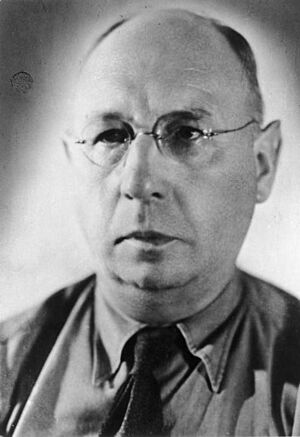Hermann Brill facts for kids
Quick facts for kids
Hermann Louis Brill
|
|
|---|---|

Hermann Brill
|
|
| Member of the Bundestag | |
| In office 7 September 1949 – 7 September 1953 |
|
| Personal details | |
| Born | 9 February 1895 Graefenroda |
| Died | 22 June 1959 (aged 64) |
| Nationality | German |
| Political party | SPD |
Dr. Hermann Louis Brill (born February 9, 1895 – died June 22, 1959) was a brave German who stood up against injustice. He was a lawyer and a politician from the SPD.
Contents
Who Was Hermann Brill?
Hermann Brill was born in a small town called Gräfenroda on February 9, 1895. His father was a tailor. After finishing school, Hermann studied to become a teacher in Gotha.
Early Steps in Politics
Hermann Brill began his political journey in 1918. He joined a group called the Independent Social Democratic Party of Germany. Just two years later, he became a member of the Thuringian parliament. This was a local government group, and he stayed there until 1933.
In 1922, Brill joined the Social Democratic Party of Germany (SPD). This became his main political home. In 1932, he also became a member of the German national parliament, known as the Reichstag.
Standing Up to Injustice
Hermann Brill strongly disagreed with the Nazis when they gained power. He especially opposed the actions of a Nazi minister named Wilhelm Frick. In 1932, Brill led a special committee. This group looked into Frick's unfair practices.
During this time, Brill met Adolf Hitler. Hitler appeared as a witness before Brill's committee. This meeting made Brill decide to resist Hitler. He vowed to fight against Hitler "at any time, anywhere, and under every circumstance."
After Hitler took full control in 1933, Brill left his party. He was upset that the party leaders seemed too passive. A year later, in 1934, he started a secret resistance group. It was called the Deutsche Volksfront (German People's Front). He worked with Otto Brass in Berlin. Brill also wrote many essays and leaflets against the Nazis.
The secret police, known as the Gestapo, arrested him several times. When his resistance group was discovered, he was accused of working against the government. In 1938, he was sentenced to 12 years in prison.
Brill was first held in a prison called Zuchthaus Brandenburg-Görden. In 1943, he was moved to a special camp called Buchenwald concentration camp. After the camp was freed on April 11, 1945, he wrote an important document. It was called the Buchenwald Manifesto. This document outlined ideas for a democratic Germany.
After the War
In April 1945, Brill started planning how to rebuild the government in Thuringia. This was for the American authorities. In June 1945, he became the head of the government in Thuringia.
However, he lost this job in July. Thuringia became part of the Soviet occupation zone. A Soviet leader named Walter Ulbricht removed him. In May 1945, Brill also started a group called the Federation of Democratic Socialists. This group later became the SPD branch in Thuringia, and Brill was its first leader.
After being arrested and questioned twice by the Soviet authorities, he left Thuringia. At the end of 1945, he began working for the American administration in Berlin.
Later Years and Legacy
In 1948, Hermann Brill helped write the new constitution for Germany. This important document is called the Grundgesetz. From 1949 to 1953, he was a member of the first Bundestag. This is the parliament of the new country of Germany. He represented the area of Frankfurt am Main I.
In his last year in parliament, he helped pass an important law. This law provided payments to people who had been treated unfairly. This included those who were targeted because of their political views, race, or religion.
In his later years, Brill taught at universities in Frankfurt and Speyer. He helped introduce the study of political science in Germany. He also wrote many articles about important topics, like German reunification.
Hermann Brill passed away on June 22, 1959, in Wiesbaden.
See also
- List of Germans who resisted Nazism
 | Jewel Prestage |
 | Ella Baker |
 | Fannie Lou Hamer |

